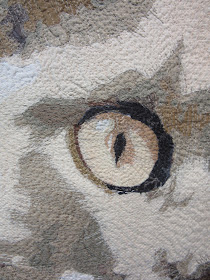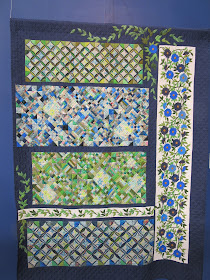Let's turn the corner into where the
Wa Quilts
are displayed.
Wa means 'the spirit of Japan' and quilts entered into this category are often made from recycled kimono fabric, be it elegant silk, maybe with intricate embroidery in silk shading, brown kasuri with specs of white, indigo dyed work wear, flimsy silk for kimono underwear or brocade from the obi belt.
These quilts often have a Japanese motif, too.


黒塚サナエ*Sanae Kurotsuka made good use of brown kasuri for this school of fish
山本与志子*Yoshiko Yamamoto also used strips of Japanese fabric for her unusual Double Wedding Ring quilt. Somehow it makes me think of an areal view of the intersection of a motorway.
伊藤千津子*Chizuko Ito used the circle, a common Japanese shape, for her quilt.
Original Quilts
Next category to look into is Original design. Here you will also find some 'Japanese' patterns.

竹田ゆう子*Yuko Taketa depicted the red spider lilies, a flower you see everywhere in late summer.

木谷雅子*Masako (?) Kitani joined together a number of quilted panels to celebrate the Japanese boardgame of Go.

柴山みさ*Misa Shibayama made this for the love of Japanese kogin embroidery.


屋部志津子*ShizukoYabe made a Mola labyrinth
白石章子*Akiko Shiraishi
武宮裕子*Yuko Takemiya
森和子*Kazuko Mori
Jeongseon Jeong (from Korea)
法量ユフ子*Yufuko Horyo (?)
田中文江*Fumie Tanaka made good use of the print for her quilting lines
重松美穂*Miho Shigematsu
木村恵子*Keiko Kimura made a fluffy spring mountainside
 |
Jiang Ying (from China) made a fluffy cat by using netting
Heeseong Suh (from Korea) joined panels of different techniques into this quilt.
It was when Julie, Tanya and I saw this quilt that we got the inspiration for next year's challenge - a Cathedral Window quilt (or bag, or panel, or waist coat....)
Talking of Tanya, you just HAVE to read her Mola report!
Tomorrow I'll show you the teacher's quilts.























Thank you for your reports they're fascinating. The handiwork of the Japanese is insanely intricate and the patience that must be required to achieve such levels of complexity is astounding. The mola labyrinth in particular is amazing, how did the maker manage to reveal so much of the second layer of fabric without tearing the top layer—witchcraft maybe?
ReplyDeleteYes, amazing is the word! I don't know how these Mola experts manage the small triangles, either. Witchcraft!
DeleteI can't tell you how much I've enjoyed your reports from the Tokyo Quilt Show. So many stunning quilts and so different from what we see here in the US. Thank you.
ReplyDeleteI think it is interesting to compare what is on display at quilt shows around the world. In Japan there is a lot of handwork, a lot of national pride in the use of kimono fabric or cherry blossoms as a motif. Other countries excel in machine quilting or amazing pictorial quilts or make statement quilts with political messages.
DeleteI like both the fishy ones. And the cat in net is getting the brain cells going.
ReplyDeleteThat cat behind the net was so realistic it was scary!
DeleteSuch amazing beautiful work. Their hand stitching and quilting is super.
ReplyDeleteI'm in awe. And you get to see this first hand!
Good challenge, a cathedral window project.
Thanks for sharing.
There are more and more machine pieced and quilted quilts, but still most quilts are lovingly made by hand.
DeleteThey're all quite splendid. You must all have left feeling quite dizzy with all that colour!
ReplyDeleteYes, the quilt show is tiring, all that inspiration, all those people, all those tempting trading stalls...
DeleteWell, by the time I find a break to write up a post, I can just refer to you and Tanya. Thanks for the great pictures and descriptions.
ReplyDeleteHa, ha! I am sure you took a loft of photos of quilts we did not focus on.
DeleteI see several quilts on your blog that I missed in person. Thank you!
ReplyDeleteI saw several quilts on Tanya's blog that I missed. The show is absolutely too huge to be done in just one day!
DeleteYou must have enjoyed yourself, there is so much to see.
DeleteI certainly did!
Delete